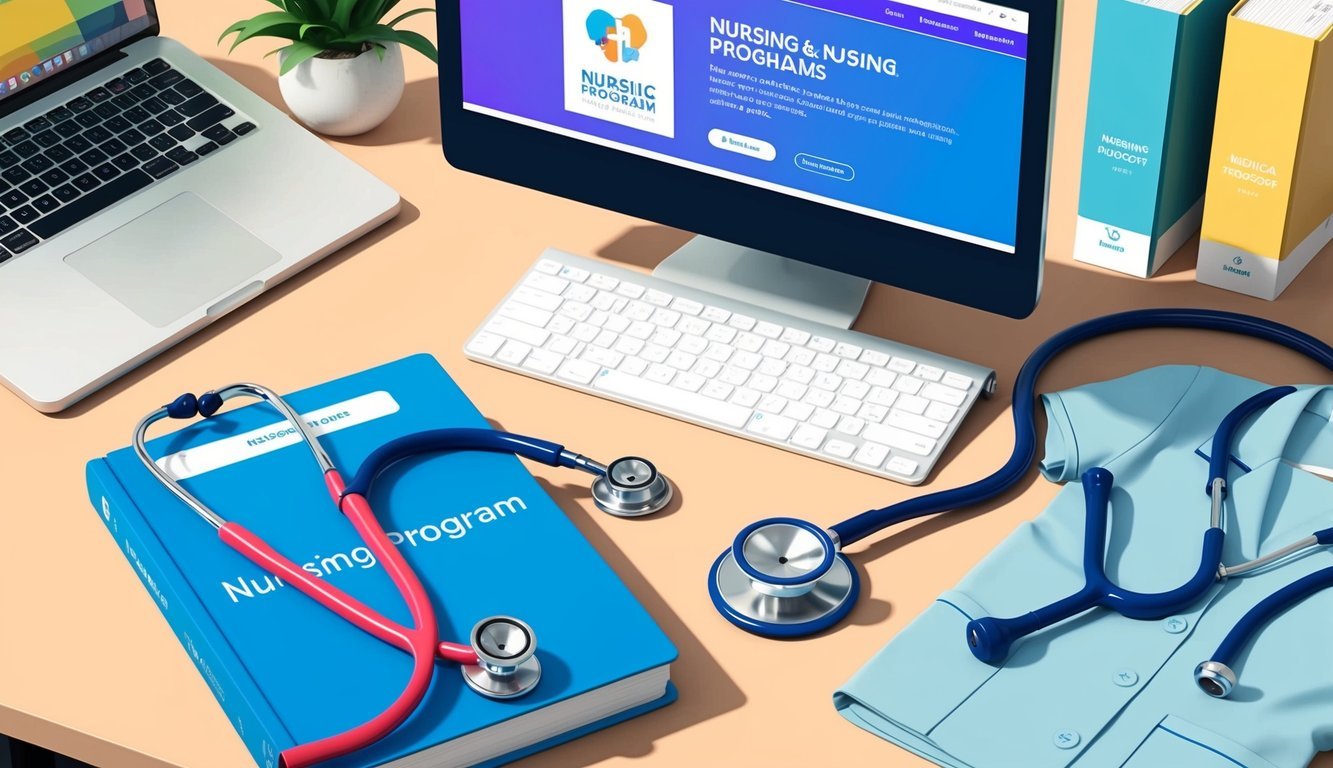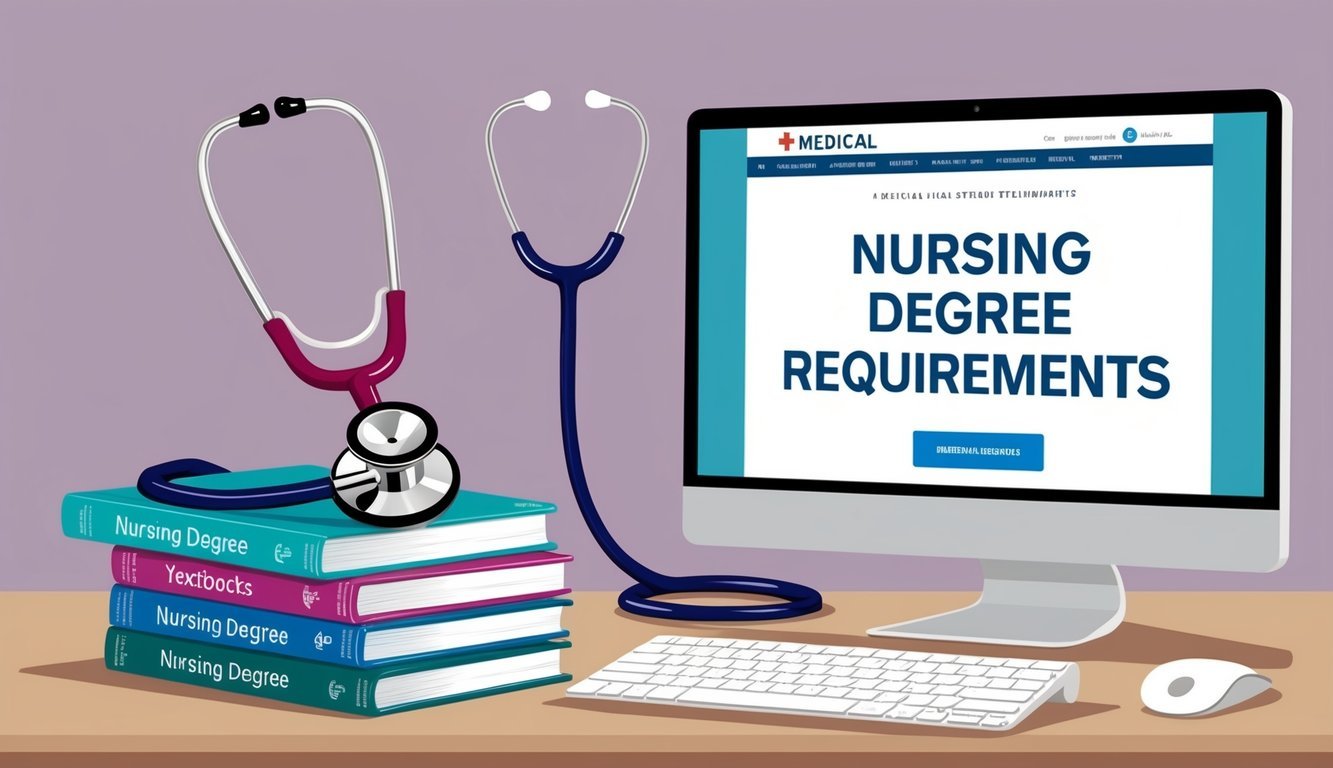Becoming a nurse is a fulfilling career path that offers numerous opportunities for personal growth and helping others.
The right education, licensure, and essential skills are needed to enter this rewarding field.
Understanding the specific requirements can make your journey smoother and more informed.
You will typically start by pursuing a nursing degree, which can be either an Associate Degree in Nursing (ADN) or a Bachelor of Science in Nursing (BSN).
After completing your education, you need to pass the NCLEX-RN examination to obtain your nursing license.
Additionally, developing core competencies in patient care, communication, and critical thinking is important for your success in this profession.
With the appropriate qualifications and dedication, a career in nursing can lead to various professional development opportunities.
The pathway may seem daunting, but it’s a chance to make a difference in countless lives every day.
Key Takeaways
- You must earn a nursing degree and pass the NCLEX-RN to become a nurse.
- Essential competencies include patient care and effective communication.
- Nursing offers numerous opportunities for career advancement and development.
Educational Pathways to Nursing
To become a nurse, you need to understand the educational pathways available.
These pathways include different nursing degrees and various programs that prepare you for this rewarding career.
The key options are the Associate Degree in Nursing (ADN) and the Bachelor of Science in Nursing (BSN).
Understanding Nursing Degrees
There are several nursing degrees you can pursue, depending on your career goals and the time you want to invest.
- Associate Degree in Nursing (ADN): This is typically a two-year program found in community colleges. It prepares you for entry-level nursing positions and allows you to take the NCLEX-RN exam to become a Registered Nurse (RN).
- Bachelor of Science in Nursing (BSN): A four-year degree is offered at universities and focused on more advanced nursing education. A BSN can lead to better job opportunities and higher salaries.
Other advanced degrees include the Master of Science in Nursing (MSN) and Doctor of Nursing Practice (DNP), which are essential for roles in leadership or specialized practice.
Overview of Nursing Programs
Nursing programs vary in structure and content, tailored to meet the needs of different students.
Types of Nursing Programs:
| Program Type | Duration | Key Features |
|---|---|---|
| ADN | 2 years | Focuses on fundamental nursing skills |
| BSN | 4 years | Includes leadership, research, and community health |
| Accelerated BSN | 12-24 months | Designed for those with a prior degree |
| RN to BSN | 1-2 years | For current RNs to earn a bachelor’s degree |
| Master of Science in Nursing (MSN) | 2 years | Prepares for advanced practice roles and specializations |
Choosing the right nursing program depends on your lifestyle, career aspirations, and previous education.
Each pathway equips you with the skills needed to succeed in the nursing field.
For more information on the types of programs, visit resources like Nurse.org.
Licensure and Certification
Obtaining a nursing license and certification is crucial for your career as a nurse.
You must pass the NCLEX-RN examination and meet specific state licensure requirements to practice.
The NCLEX-RN Examination
The NCLEX-RN exam is a standardized test that assesses your knowledge and skills as a registered nurse.
This exam is essential for obtaining your nursing license.
Key aspects of the NCLEX-RN exam:
- Format: Multiple-choice questions, including select-all-that-apply.
- Testing Length: Up to 145 questions, with a maximum time of 5 hours.
- Content Areas: Safe and effective care, health promotion, and maintenance.
To prepare, consider using review courses and practice tests.
For more information about the exam, visit the NCSBN website.
State Licensure Requirements
Each state has its own licensure requirements for nurses.
You need to be aware of these to ensure you meet their standards.
Typical requirements include:
- Completion of an accredited nursing program.
- Successful passing of the NCLEX-RN exam.
- Submission of an application for licensure.
- Payment of applicable fees.
Some states may also require background checks or additional tests.
For more details on specific state requirements, check the Nursing Licensure Guidance page.
Core Nursing Competencies
As a nurse, you need a wide range of competencies to provide safe and effective care.
These skills encompass both general nursing abilities and specialized practices essential for specific patient needs.
Clinical Skills and Patient Care
Clinical skills are essential for registered nurses (RNs) in delivering high-quality patient care.
Core competencies include:
- Assessment: You must perform thorough physical examinations and gather medical histories to evaluate patient health.
- Critical Thinking: This allows you to make quick decisions during emergencies, especially in critical care settings.
- Patient Communication: Clear communication helps establish trust and ensures patients understand their treatment plans.
- Documentation: Accurate record-keeping ensures continuity of care and compliance with healthcare regulations, which is crucial during clinical rotations.
These skills form the foundation of your nursing practice and are vital to the nursing scope of practice.
You can refer to the American Nurses Association for further guidance on essential competencies.
Specialized Nursing Skills
Certain nursing specialties require additional skills tailored to specific patient populations.
Here are key areas:
- Pediatrics: You need to adapt your approach when caring for children, including understanding growth milestones and how to properly communicate with young patients and their families.
- Pharmacology: Knowledge of medications, including dosages and side effects, is critical. This skill ensures patient safety and effective medication management.
- Wound Care: Learning and applying specialized techniques for wound management are vital in various healthcare settings.
Acquiring these skills will enhance your ability to meet the diverse needs of your patients.
For more on specialized training and competencies, consider visiting The Essentials: Competencies for Professional Nursing Education.
Advancing in the Nursing Career

Advancing in your nursing career involves gaining additional qualifications and applying for more specialized roles.
This journey can also lead you to higher levels of responsibility and increased earning potential.
Continuing Education and Specialization
Continuing education is crucial for your growth as a nurse.
Many employers prefer or require nurses to pursue further education to stay updated with the latest healthcare practices.
You can enhance your skills through various options, including:
- BSN Degree: If you hold an associate degree, completing a RN to BSN program can open many doors for advancement.
- Specialty Certifications: These certifications allow you to specialize in areas such as pediatrics, geriatrics, or critical care.
Engaging in seminars and online courses keeps your knowledge current and shows commitment to your profession.
Many organizations also offer support for continuing education, which can make this process more accessible.
Transitioning to Advanced Practice
Transitioning to advanced practice means moving from a registered nurse (RN) to roles like nurse practitioner (NP) or clinical nurse specialist.
To do this, you typically need:
- Master’s or Doctoral Degree: Advanced practice roles require further education beyond a BSN.
- Certification: You will need to pass certification exams in your chosen specialty area.
Advanced practice nurses often have the authority to diagnose and treat patients, prescribe medications, and provide comprehensive care.
This path not only enhances your career opportunities but also allows you to make a more significant impact on patient care and outcomes.
By following this route, you increase your potential for leadership roles within healthcare settings.
Professional Development and Opportunities

As a nursing student, you will find that professional development is crucial for building a successful nursing career.
Opportunities in this field ensure job security and allow you to contribute meaningfully to public health.
Career Prospects and Job Security
Nursing offers strong career prospects due to a growing demand for healthcare professionals.
According to the U.S. Bureau of Labor Statistics, nursing jobs are expected to grow much faster than many other occupations.
Typically, registered nurses earn a median annual wage of around $77,600, which varies by location and specialization.
The stability within the healthcare sector provides job security, making nursing a reliable career choice.
- Job Growth Rate: 6% from 2021 to 2031
- Top Specialties: Critical Care, Pediatrics, Geriatrics
Consider pursuing certifications to enhance your employability.
Many employers look favorably upon candidates who continue their education, leading to increased career advancement.
Contributing to Public Health and Policy
Nurses play an essential role in shaping public health initiatives and influencing healthcare policy.
By participating in community health programs and advocacy groups, you can significantly impact the well-being of your community.
Engaging in professional development activities, such as attending workshops or seminars, prepares you to take on leadership roles.
You can contribute to policy discussions and initiatives that aim to improve healthcare access and quality for all.
- Roles: Community Nurse, Public Health Advisor, Nurse Educator
- Impact Areas: Vaccination programs, Disease prevention, Health education
Your enhanced skills and experience can turn you into a valuable asset in addressing public health challenges.
For more information on nursing professional development, visit Nursing Professional Development Certification.
Frequently Asked Questions

This section answers common questions about the requirements to become a registered nurse.
You will find specific details about education, qualifications, and the licensing process.
What education is needed to become a registered nurse?
To become a registered nurse, you typically need either an Associate Degree in Nursing (ADN) or a Bachelor of Science in Nursing (BSN).
While an ADN can be earned in about two years, a BSN usually takes four years to complete.
Many employers prefer candidates with a BSN.
How many years of study are required to become a registered nurse?
The time required to become a registered nurse can vary.
If you pursue an ADN, it usually takes about two years.
If you choose a BSN program, expect to be in school for four years.
Additionally, you may need time for prerequisites before starting your nursing courses.
What qualifications and skills are necessary for a nursing career?
Key qualifications for a nursing career include strong communication skills, critical thinking, and empathy.
You also need to demonstrate technical skills, such as the ability to handle medical equipment and perform procedures.
Attention to detail is crucial for ensuring patient safety.
What are the steps to becoming a nurse after completing high school?
After high school, the steps to becoming a nurse generally include:
- Complete prerequisites: Take necessary courses like biology and chemistry.
- Enroll in a nursing program: Choose between an ADN or BSN.
- Pass the NCLEX-RN exam: After graduation, you must take this licensing exam.
- Apply for a nursing license: Submit your application to your state’s nursing board.
What are the minimum academic and professional requirements for a nursing position?
The minimum academic requirements include a high school diploma or GED and completion of a nursing program.
Most positions also require passing the NCLEX-RN.
Some employers may prefer candidates with experience or additional certifications.
What is the process and duration for obtaining a nursing license in Texas?
In Texas, you must follow several steps to obtain a nursing license:
- Complete a nursing program: You need to graduate from an accredited nursing school.
- Apply for the NCLEX-RN: Once you finish the program, you should register for the exam.
- Submit an application: After passing the exam, you can apply to the Texas Board of Nursing for licensure.
The entire process can take several months, depending on the time required to receive exam results and process your application.
Check the Texas Board of Nursing for specific details and updates.

